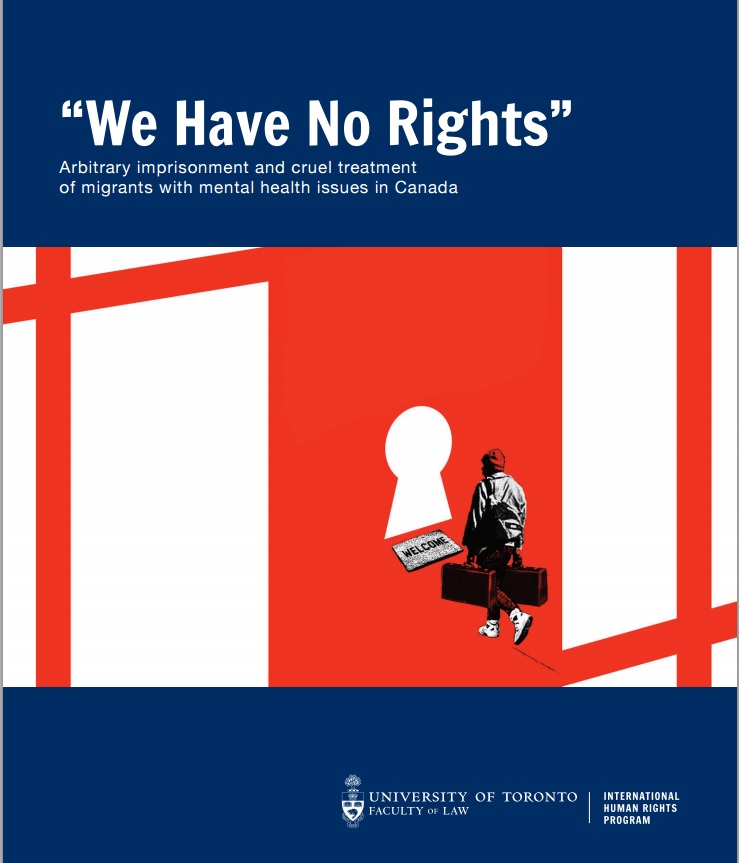This is an archive of news stories and research from the National Union of Public and General Employees. Please see our new site - https://nupge.ca - for the most current information.
New report finds that Canada Border Services Agency’s imprisonment of migrants with mental health issues is arbitrary, cruel, discriminatory and violates rights.
 Toronto (19 June 2015) — A report from the University of Toronto's International Human Rights Program (IHRP) finds that Canada Border Services Agency’s (CBSA) treatment of non-citizens with mental health issues is in breach of Canada’s international human rights obligations as it is discriminatory, constitutes indefinite and arbitrary detention, is cruel and inhuman, and violates the right to health.
Toronto (19 June 2015) — A report from the University of Toronto's International Human Rights Program (IHRP) finds that Canada Border Services Agency’s (CBSA) treatment of non-citizens with mental health issues is in breach of Canada’s international human rights obligations as it is discriminatory, constitutes indefinite and arbitrary detention, is cruel and inhuman, and violates the right to health.
“We have no rights”: Arbitrary Imprisonment and Cruel Treatment of Migrants with Mental Health Issues in Canada reports that the CBSA routinely detains migrants with mental health issues in maximum-security jails—sometimes for years—despite their vulnerable and non-criminal status.
"This report makes an important contribution to the discussion around incarcerating those with mental health issues in this country," said James Clancy, board member of the Public Services Foundation of Canada. "This research builds greatly on the finding of the PSFC report on overcrowding and inmates with mental health problems in provincial correctional facilities."
Incarceration brings serious consequences for those with mental health issues
“Our report reveals shocking gaps in the rule of law,” says Renu Mandhane, IHRP executive director. “CBSA transfers migrants who are not serving a criminal sentence to provincial jails in the absence of adequate laws, regulations, or policies. Counsel are not given notice and detainees do not have an opportunity to challenge confinement in maximum security conditions despite the catastrophic impact imprisonment has on their mental health.”
"We Have No Rights," released in advance of World Refugee Day on June 20, profiles detainees who have been imprisoned between two months and eight years. IHRP researchers travelled to three Ontario jails to interview detainees and collect these “voices from the inside.” Overwhelmingly, the detainees communicated despair and anxiety over their immigration status, their seemingly indefinite detention, their lack of legal rights, their conditions of confinement, and the lack of adequate mental health treatment to allow them to get better.
Worrisome shift in CBSA culture
Last year, there were more than 7,000 migrants detained in Canada. "We Have No Rights” includes damning CBSA statistics that chart the rising cost of immigration detention over the past nine years (more than $50 million last year), and ever-increasing “detention days.” In an exclusive interview, Reg Williams, director of CBSA immigration enforcement in Toronto from 2004 until his retirement in 2012, provides important insights into CBSA’s institutional culture, stressing “the culture is heading in one direction only—towards a more para-militaristic organization where the emphasis is on power and force, and less on interaction, cooperation and engagement.”
In a foreword to the report, the world’s leading expert on international refugee law, Professor James Hathaway of the University of Michigan Law School, says “States too commonly assume… that migrant detention is somehow a national prerogative that can be automatically exercised, and without any real regard for the usual rules of fair play. This is emphatically not the case under international law, as this study so cogently affirms.”
“We Have No Rights” was researched and written by two law students enrolled in the IHRP’s award-winning legal clinic.
List of targeted recommendations
The report includes a list of targeted recommendations aimed at lawmakers, the Minister of Public Safety and Emergency Preparedness, Citizenship and Immigration Canada, and the provinces. As a first step, it calls on the government to create an independent body/ombudsperson responsible for overseeing and investigating CBSA and to whom immigration detainees can complain, to create and effectively employ alternatives to detention, and to create a presumption against detention beyond 90 days (consistent with practices in the EU and US).
IHRP executive director, Renu Mandhane, and summer fellow, Logan St. John-Smith, will be travelling to Geneva in July to present the report to the UN Human Rights Committee to assist in its review of Canada’s compliance with the International Covenant on Civil and Political Rights. The Committee considers states parties’ compliance with the treaty every five years.
More information:
Crisis in Correctional Services
NUPGE
The National Union of Public and General Employees (NUPGE) is one of Canada's largest labour organizations with over 360,000 members. Our mission is to improve the lives of working families and to build a stronger Canada by ensuring our common wealth is used for the common good. NUPGE
